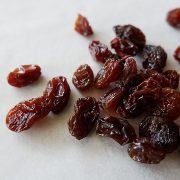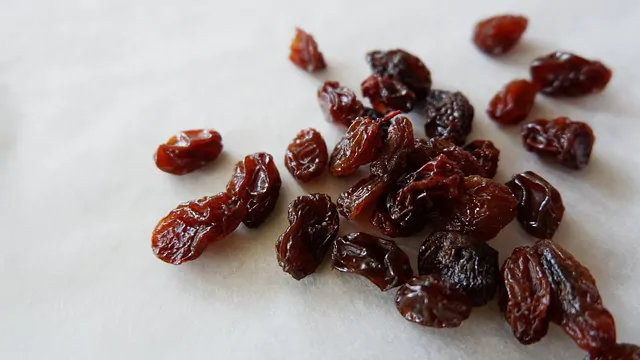Raisin Wine Recipe – A Wine You Can Make Year Round
Dried fruits are great for making wine, especially when the winter comes around and fresh fruit isn’t in season. This Raisin wine recipe makes a wine that is nice and warming, similar to sherry and a great wine to make from a store cupboard ingredient.
Raisins are great for making wine. You will have probably seen that many wine recipes make use of them. This is because a small amount imparts a lot of flavour and body which a lot of more subtle fresh fruit wines can lack. You will be pleased to know that raisins can be used as the sole fruit in a fruit wine and there a more varieties of raisins than you might expect so there is some room for experimentation too.
Table of Contents
Flavour Packed Raisins
Drying fruit changes the flavour this is why raisins, whilst tasting fruity don’t taste like grapes. Drying any food tends to intensify the flavours and this is a big benefit for winemaking as these intense flavours really shine through in the finished wine.
Raisins are also packed full of sugar another boon for the winemaker as we rely on sugars to make alcohol, the more sugar that comes from the fruit the better as adding plain sugar whilst boosting the alcohol content does not introduce any flavour.
Varieties Of Raisin
When shopping for ingredients for your raisin wine you may be surprised at just how many types of raisin there are available. The raisins you might find are:
Golden Raisins, Muscat Raisins, Black Flame Raisins, Red Raisins and Green Raisins
All will produce a wine of slightly different colour and flavour. Each variety is worth experimenting with as you will often find they are produced from different grape varieties that will produce a unique wine.
Beware Of Oil & Preservatives
Where possible you will want to check the label on any raisins you buy to see what the ingredients are. You may find some dried fruits are coated in oil during production which we want to avoid as the oil will tend to slick on top of the wine and will likely cause undesirable flavours.
Sultanas are usually dipped in oil as part of the drying process so you will want to steer clear of using these.
Some dried fruit is treated with sulphur, fruit like apricots often are to preserve their colour. These are usually fine for winemaking and won’t make a noticeable difference. If there are other preservatives listed, however, you will likely want to pass on using these to make wine unless you know they won’t interfere with either the flavour or the yeast health.
Preparing Raisins For Making Wine
To get the most out of the raisins you use you will need to chop them to prepare them for winemaking. You tend to find when whole raisins are soaked in a liquid they tend to swell plump up and absorb the liquid. Our objective, being to extract the flavours, sugars and colour from the raisins means they need to be chopped or minced to extract maximum flavour.
A decent food processor can make light work of this and should only take a moment. The raisins don’t need to be fine particles but just chopped/minced roughly.
What You’ll Need To Make Raisin Wine – Makes 1 gallon / 4.5 litres
- Small Fermenting Bucket
- Demijohn
- Large Pan
- Syphon
- Fine Straining Bag
- Airlock & Bung
Raisin Wine Ingredients
1kg Raisin (chopped into small pieces)
4.5 litres Water
900g Sugar
1/2 tsp Acid Blend
1 tsp Yeast Nutrient
1/2 tsp Pectic Enzyme
1/4 tsp Wine Tannin
1 Campden Tablet
1 sachet of Yeast (Montrachet is a good choice)
Process
1. Begin by heating the sugar and the water together in a pan. Stir to dissolve the sugar and ensure it does not scorch and gradually bring to a boil.
2. As the sugar solution is heating take the chopped raisins and place them in the straining bag. Secure and drop the bag into a sanitised fermenting bucket. After the sugar has boiled for a few moment take off the heat and pour straight over the raisins in the fermenting bucket. Give everything a good stir to break up the raisins that may have clumped together.
3. Allow the must to cool, once tepid add the acid blend, wine tannin, yeast nutrient and the crushed campden tablet. Mix through the must and cover with a lid and airlock.
4. At least 12 hours after adding the Campden tablet and other additives add the pectic enzyme and mix through the must. Re-cover and leave for a further 12 hours.
5. After another 12 hours sprinkle the yeast on top of the must and allow fermentation to begin. After a day or 12 you will begin to notice activity through the airlock.
6. Allow fermentation to progress for 7 days giving the must a stir every day. After 7 days lift out the bag of spent raisins and allow to drain thoroughly. Leave the raisin wine to settle for a couple of days and then rack to a demijohn.
7. Leave the raisin wine in the demijohn to condition. Rack every 30 days or after sediment has built up. Leave for roughly 3 – 4 months until the wine has cleared before bottling. You may wish to back sweeten the wine if you prefer a sweeter finish. Follow this guide for advice on how to go about back sweetening your wine.
Raisin wine is best aged for a while before drinking, in fact it will get better after a year or more and does really well being kept upwards of 2 – 3 years. However long you want to leave it in bottle you can be sure it will produce a delicious wine.





I notice in this recipe that you instruct to rack every 30 days or when sediment has built up. But other recipes, you call to rack only twice before bottling (e.g., the blueberry recipe). Is there a general principle or rule of thumb for how often to rack?
This wind came out really well. Everyone was impressed and has some good sweetness to it without adding any extra sugar.
Yes it would give you the WIND!!
What temperature should fermentation go on?
Montracht wine yeasts tend to have a wide temperature range anything from 15-30 C or 59-86 F. As long as the temperature is consistent is the main thing to consider.
Really glad that I found this website, specially because I am taking the first steps. Could we use bentonite for clearing, 1 month after being on the demijohn, and then bottling after bentonite does the work?
You can use bentonite for clearing. It is probably quicker and easier to use something like Chitosan and Kieselol after fermentation. Take a look at this guide for a bit more info.
Thanks for the reply Neil. I am going to start this recipe this weekend and I am just wondering about the sugar quantity. The raisins usually have about 73% of sugars in 100g of weight. Considering that, would not be 900g of sugar too much? Sorry I might be missing something. Additionally using a hydrometer before pitching the yeast would work right? as the sugars from the raisins are still not diluted into the water.. Thanks for all the information you put on your website, it is really helpful for a beginner.
use high alcohol resistant yeast, and more sugar will be alcohol, and less sweetness left over, you can hit 21% if you’re paying attention. Good luck!